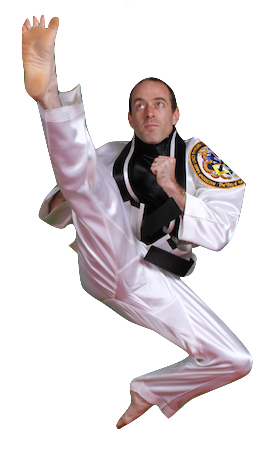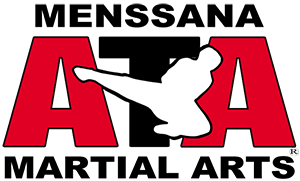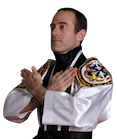
Knowledge
Not long ago, I was at an advanced training camp when I found myself paired with a sixth degree black belt in her early seventies. I had hoped for a more vigorous training partner, but I swallowed my disappointment. We squared off, and I threw a soft round kick at her head, not too fast out of deference to her age. She easily blocked the kick and then--THUD!--punched me full-force in the stomach. I caught my breath, and her message: She was there to learn.
My elderly sparring partner understood that learning is a lifelong process. In order to fully embrace that process, we must be willing constantly to challenge what we think we know--about our world and about ourselves.
Knowledge as Process
When I received my first degree black belt, I felt like a fraud. The rank of black belt carries a mystique. It represents advanced martial arts knowledge. But I lacked confidence in my skills. I could kick well, but my instincts were not finely honed. I wondered how I would fare if I were attacked unexpectedly. Like most people, I saw the black belt as an emblem of expertise, the culmination of my hard work. But I felt that I had only begun to learn.
Many years later, I recognize that my feeling of inadequacy arose from an important insight: The pursuit of knowledge is a journey with no destination. The external markers of education do not cap our quest for knowledge. They simply highlight the steps we have taken. I now tell my students that although earning a black belt is a meaningful milestone, it marks a beginning rather than an end. That is why, in Songahm Taekwondo, the first degree black belt poom-sae is called Shim Jun, which is interpreted to mean, “Begin planting seeds for the future.”
This notion of knowledge as process is central to the martial arts. In Songahm Taekwondo, it is represented by the pine tree. As an evergreen tree, the pine tree represents continuous growth. The martial artist strives to be like the pine tree, always growing. A dedicated Taekwondo student may spend two or three years reaching first degree black belt, another twenty years becoming a master--and the rest of his or her life continuing to acquire a deeper knowledge of the martial arts.
Understanding that knowledge is an ongoing process has practical consequences beyond the dojahng. For centuries, doctors believed that physical ailments resulted from an imbalance in four humors in the body: black bile, yellow bile, phlegm and blood. Depression, for instance, was thought to result from excessive black bile. No reputable doctor would make such a claim today.
While our scientific knowledge has advanced tremendously, it remains fallible. In the late 1950s, doctors believed Thalidomide was a risk-free way to cure pregnant women of morning sickness. Instead, the drug caused horrific birth defects in their children, including flipper-like limbs and other deformities.
Today, medical science is typically as confident about its knowledge as it was about the four humors and the power of Thalidomide. There is no way to predict which, if any, of our currently accepted scientific truths will someday be discredited. But if we can accept that knowledge is always evolving, then we can be appropriately cautious about today’s certainties. And we can be receptive to research that challenges those beliefs and enhances our understanding. A willingness to accept fallibility could have prevented the Inquisition-era persecution of Galileo for challenging the conventional wisdom that the earth was the center of the universe.
The point is that we almost always believe we are right--until we realize we are wrong. At the heart of almost any argument is a disagreement about whose knowledge is accurate. And the biggest obstacle to resolving most arguments is the unwillingness to accept that we do not always know what we think we know.
I learned this powerful lesson from my wife, early in our relationship. She was finishing her final year as an undergraduate at Oxford. In a few months, she would spend a week taking seven three-hour exams. Because Oxford has no real grades or transcripts other than these final exams, her entire academic career would be judged on the basis of her performance during that one week. When she attended a pre-exam counseling session, she heard one student confess that he was so anxious he had contemplated suicide. The counselor responded, “I can understand that. These exams are very important!”
One night, to relieve the stress, I took her to dinner and a movie. She was irritable and impatient with me all evening. I’m sure she felt that I was being irritating and trying her patience. Eventually, I said to her, “You’re taking out your stress on me.” A wave of recognition washed over her 21-year-old face. The thought had not previously occurred to her. But rather than resist it and insist that everything was fine or that I was the problem, she allowed her knowledge to evolve: “You’re right,” she said. “I’m so sorry.” For the rest of her exam period, she turned to me for support rather than turning against me in her moments of anxiety.
Since then, I have noticed that the most potent way to end an argument is not to convince the other person I am right, but to listen undefensively to his or her argument and to consider the possibility that I am wrong. Nothing stops the fighting faster than saying, “You’re right. I’m sorry.” (And even when you are the one who is right, the other person is more likely to come around to your view when they feel you were receptive to their position and listened thoughtfully to it.) But a steadfast adherence to our own infallibility too often makes this resolution impossible. It is only when we recognize that our knowledge has not yet reached its limit that we can begin not only to accept but to eagerly embrace the possibility that someone else is right and we are wrong.
This process can be humbling, especially as we age or achieve professional status. For children, learning is easy. I do not mean that all children acquire knowledge with ease. But they are not burdened by the idea that they should already have knowledge. They are in a near-perpetual state of learning. Consequently, they tend not to resist new ideas and experiences.
But for adults, especially adults who occupy positions of authority, learning can be uncomfortable. As we grow older, our social and professional lives often become more tightly constrained. The body of knowledge that we need to internalize becomes limited. One of the things I liked about being a public defender was the fact that the law was constantly changing, so it was necessary always to stay abreast of emerging legal developments. But even that fluidity had its boundaries: I had little need to learn much beyond the relatively narrow confines of the California Penal Code and the caselaw surrounding it.
If you are like me, by the time you have had a job for a few years you have developed some proficiency in a fairly limited realm of knowledge. You take comfort in this proficiency. And others who lack your experience begin to look up to you. You convince yourself that you are something of an expert – a black belt in your field.
The temptation in these circumstances is to avoid stepping outside of this hard-won comfort zone. That is why I am always impressed by my Taekwondo students who start training in their forties or fifties or sixties. Unlike the children I teach, these adults have not been students in years. They have risen to comfortable levels of knowledge and respect--as parents, spouses, business executives, construction contractors, etc. Yet they have forsaken the comfort of their existing knowledge in order to learn something new. However powerful or authoritative they may be at home or on the job, in the Taekwondo class they are white belts who move awkwardly and are shocked to find themselves forgetting which is their left hand and which is their right. These adults have taken a risk. They have embraced the challenge of new knowledge instead of seeking refuge in what they already knew.
Perhaps the best example of humility in the pursuit of knowledge is a woman named Nola Ochs. When she enrolled in her first course at Fort Hayes State University in Kansas, she was nineteen years old. Her studies were interrupted by the demands of raising a family, and many years passed before she returned to school. In 2007 she finally graduated--at the age of ninety-five. She is the living embodiment of Songahm Taekwondo Grand Master Soon Ho Lee’s adage: “There is always more to learn.”
Recognizing that there is always more to learn means accepting that our knowledge is always imperfect. And coming to terms with our imperfection enables us to seek the most important type of knowledge: Self-knowledge.
Self-Knowledge
I once had a teenage student whom I’ll call Caleb. A burly kid, Caleb seemed sullen in class. He lumbered through his movements, eyes to the floor, never saying a word. The rest of the class responded to commands with loud shouts of “Yes, Sir!” But Caleb remained silent. During exercises, the other students punctuated their kicks with loud kihaps. Caleb was mute. When I confronted him about his refusal to kihap, he offered no explanation. He reminded me of Bartleby, the Herman Melville character who refused to do any work and, when questioned by his employer, simply said: “I would prefer not to.”
Eventually, Caleb’s mother told me that he was not being defiant; he was simply depressed. With this knowledge, I was able to take a less confrontational approach with Caleb. Rather than threatening him with pushups for failing to kihap, I tried to coax him out of his shell and to give him challenges that would build his confidence.
As he moved through the ranks, Caleb became marginally more outgoing. His interest in Taekwondo grew, and he joined my leadership program. He became a trainee instructor and assisted with my children’s classes. He came to me frequently with questions about how to handle situations that arose in class, and shared insights on how I could improve my programs. And when he performed kicks during class exercises, he began to kihap, ever so faintly.
Impressed by Caleb’s emerging confidence and growing commitment to Taekwondo, I was disappointed to learn from his mother that the changes I had seen in him were not as evident at school. His apparent insolence had begun to anger his teachers and to earn him stays in after-school detention. I remembered how I had mistaken his depression for defiance, and feared his teachers were doing the same.
One evening after class, I spoke to Caleb about his problems in school. Recalling his inability to explain why he wouldn’t kihap a few years earlier, I began the conversation with guarded expectations. But Caleb surprised me with his self-awareness. He acknowledged that he was having trouble in school. And he explained that he did not mean to be disobedient. He gave an example: His teacher was re-arranging the classroom seating and assigned Caleb a front-row seat. He told her he did not want to sit there. She felt challenged and sent him to detention.
I asked Caleb what was wrong with the front-row seat. “I don’t want everyone’s attention on me,” he said. I pointed out that he regularly took center stage at my school, leading warm-up exercises and teaching small groups of children. “It’s different here,” he explained. “I’m more open here than I am at school.” Having been in my classes for so long, he said, he felt comfortable among everyone; his position among his fellow students seemed secure. He confessed that he was having difficulty translating his growing confidence in the dojahng into similar self-assurance beyond the mat.
Caleb may still have had some distance to go before he could cast off his shyness and social unease at school. But his recognition of this problem, and his ability to articulate it, showed a level of self-knowledge that had been absent a few years earlier.
Self-knowledge, perhaps paradoxically, is the hardest knowledge to acquire. We ought to know ourselves better than we know anyone else. And yet we remain in so many ways mysteries to ourselves. One reason is that we construct a narrative in which we play the starring role. The more committed we become to that narrative, the harder it is to question its authenticity. We become victims of what psychologists call confirmation bias: We are receptive to information that confirms what we already believe about ourselves and our lives, and we shut out information that contradicts these beliefs.
For an example of confirmation bias, consider the shell we build to protect our political opinions. We like to think that our beliefs stem from logic rather than emotion. But science is increasingly challenging that view. In 2004, Emory University scientists used functional magnetic resonance imaging (fMRI) to determine which parts of the brain were activated when people were shown evidence that presidential candidates George W. Bush and John Kerry had contradicted themselves. The fMRI showed that the conflicts activated the areas of the brain associated with emotion, not rational reasoning.
The study participants were asked to evaluate each candidate’s statements. Bush supporters denied or discounted his obvious contradictions, and Kerry supporters did the same with his. But they each recognized the conflicts in the statements of the candidate they opposed. Drew Weston, the Emory psychologist who led the study, concluded: “None of the circuits involved in conscious reasoning were particularly engaged. Essentially, it appears as if partisans twirl the cognitive kaleidoscope until they get the conclusions they want, and then they get massively reinforced for it, with the elimination of negative emotional states and activation of positive ones.”
In other words, rather than base our views on evidence, we tend to look for evidence to support our views. Vice-President Dick Cheney reportedly requires his staff to turn all televisions to Fox News before he enters the room. Liberals listen to NPR and avoid more conservative media sources. We gravitate toward friends who think the way we do. We enter a self-imposed echo chamber where everything we hear or read confirms what we already believe, and it becomes increasingly inconceivable that any rational person could have an opposing belief.
This confirmation bias prevents us from questioning our own narratives. If your self-image is one of a good husband, supportive father and satisfied employee, then you are likely to notice the details that confirm this image (a good-morning kiss from your wife, your son’s grateful smile when you help him with homework, a boss’ compliment). And you are less likely to notice the details that challenge it (your failure to ask your wife about her day, your sporadic attendance at your son’s baseball games, the growing amount of time spent catching up on email at the office). You think you know yourself, but it turns out your self-knowledge is artificial and incomplete.
As with any kind of knowledge, we must constantly challenge our self-knowledge. The legendary Japanese swordsman Miyamoto Musashi wrote, “Having attained a principle, one detaches from the principle….” Our knowledge grows in proportion to our willingness to part with what we already know. Joe Hyams, a former student of Bruce Lee, illustrated this point in his classic bookZen in the Martial Arts. He recounted a story that Lee had shared with him: A professor visits a Zen master. The master can see that the professor is more interested in impressing the master than in learning from him. The master offers the professor some tea. He pours the tea into the professor’s cup, and keeps pouring even after the cup is full and the tea is overflowing. When the professor protests that the cup is already full, the master replies: “Like this cup, you are full of your own opinions and speculations. How can I show you Zen unless you first empty your cup?”
Many martial arts schools begin classes by reciting a vow to seek “knowledge in the mind, honesty in the heart, and strength in the body.” These three traits are complementary and intertwined. Physical exercise energizes us and enables us to focus our minds on the quest for knowledge and honesty. It also provides a pause in our daily routine. Athletes often experience the feeling of entering a trancelike state while they exercise. Martial artists achieve this state during the performance of their forms, or poom-sae. They become focused on nothing but the execution of the movements. Claremont psychology professor Mihály Csíkszentmihályi calls this a “flow state,” where performance becomes automatic and almost effortless, and there are no distractions. In the martial arts and Zen Buddhism, this state is known as mushin (or mushin no shin), meaning “mind-no mind.” Entering that state allows us to step outside of ourselves. This separation from self is the first step toward challenging our self-knowledge.
But to truly gain knowledge in the mind--especially knowledge of ourselves--requires honesty in the heart. When a disciple asked Confucius to define knowledge, he replied: “When you know a thing to recognize that you know it; and when you do not, to know that you do not know,--that is knowledge.” And that type of knowledge requires honesty: The honesty to recognize that we are incomplete and imperfect, and that we do not always know ourselves or our worlds as well as we think we do.


